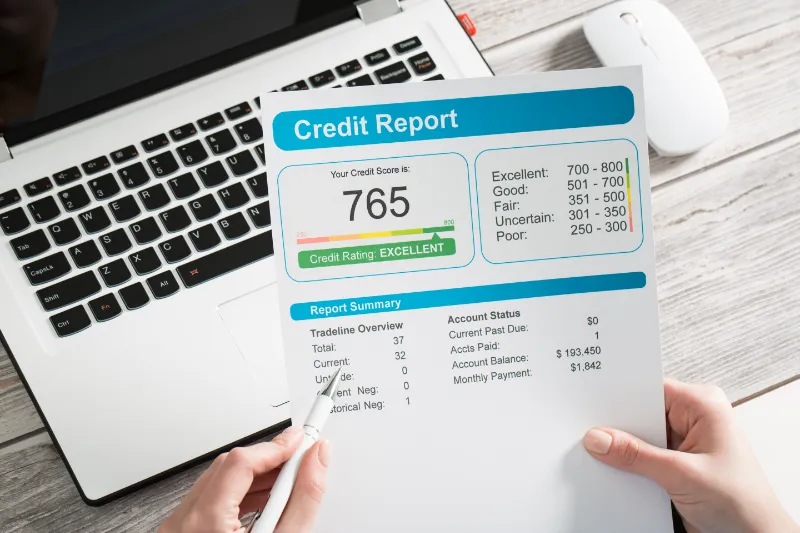Improving credit scores for mortgage approval is crucial for securing the right loan options and…
How Credit Impacts Various Home Loans In Texas
Planning to buy a home in Texas? Understanding how your credit impacts your ability to secure a mortgage is crucial. Your credit score plays a significant role in the home loan process. From the type of loan you qualify for to the interest rates you receive, creditworthiness influences every step. Let’s delve into the intricate world of credit scores and their impact on purchasing a home in the Lone Star State.
Credit scores & the impact on the Texas Home Buying Process
Understanding credit scores is crucial when navigating the Texas home buying process. Credit scores, reflecting creditworthiness, significantly influence your mortgage options. Lenders use this data to assess risk and determine interest rates for your loan. With higher scores, you may access better rates and terms, ultimately affecting your monthly payments and total interest paid over the life of the loan. It’s essential to maintain good credit through responsible financial management to secure the best home loan deals in Texas.
Credit Scores
Your credit score is a three-digit number that reflects your creditworthiness based on your credit report. It helps lenders evaluate the risk of providing you a mortgage loan. A higher score signifies responsible credit usage, making you a preferred candidate for lower mortgage rates. On the contrary, a lower score may lead to higher interest rates or even loan denial, affecting your ability to buy a home in Texas. Maintaining a good credit score is crucial for securing favorable terms and affordable monthly payments on your home loan.
How Credit Scores Influence Your Home Loan Options in Texas
Credit scores significantly impact your home loan options in Texas. Lenders use your credit score to assess your creditworthiness and determine the interest rate you qualify for. A higher score can lead to better loan terms, lower interest rates, and lower monthly payments. On the contrary, a lower score may result in higher interest rates and less favorable loan terms. Understanding how credit scores influence your options is crucial for securing the best home loan in Texas.
The Impact of Credit Scores
Your credit score significantly influences your ability to secure a favorable mortgage rate in Texas. Mortgage lenders use this score to assess the level of risk you pose as a borrower. A higher credit score generally translates to a lower interest rate, saving you money over the life of the loan. On the contrary, a lower credit score may result in a higher interest rate, leading to increased total interest paid. Understanding how credit scores impact loan terms is crucial for making informed home buying decisions in Texas.
Analyzing How Different Credit Scores Affect Mortgage Rates in Texas
Mortgage rates in Texas can be significantly impacted by credit scores. Lenders use credit scores to assess an individual’s creditworthiness, which ultimately influences the interest rate offered. Higher credit scores typically result in lower mortgage rates, leading to reduced overall costs during the life of the loan. Conversely, lower credit scores may lead to higher interest rates, increasing the total amount paid over time. Understanding the relationship between credit scores and mortgage rates is crucial for Texas home buyers seeking the best rates and terms for their mortgage loans.
The Relationship Between Credit Scores and Loan Terms
Understanding the relationship between credit scores and loan terms is crucial when applying for a home loan in Texas. Lenders assess your credit score to determine the interest rate, loan amount, and repayment period you qualify for. Generally, a higher credit score can lead to more favorable loan terms, such as a lower interest rate and reduced monthly payments. On the other hand, a lower credit score may result in higher interest rates and stricter repayment conditions. It’s essential to maintain a good credit score to secure the best loan terms available.
Loan Options in Texas & Their Credit Requirements
When considering loan options in Texas, it’s crucial to understand the credit requirements associated with each type. For conventional loans, a higher credit score is typically needed to secure favorable terms. VA loans, backed by the Department of Veterans Affairs, offer more flexible credit requirements for eligible veterans. FHA loans, insured by the Federal Housing Administration, are accessible to borrowers with lower credit scores. Jumbo loans, designed for higher-priced properties, often require excellent credit to qualify. Knowing these credit requirements can help you choose the right loan option in Texas.
Conventional Loans
Conventional loans are mortgage loans not backed by a government agency. They often have stricter requirements, including higher credit score thresholds and lower debt-to-income ratios. These loans typically have fixed interest rates and require private mortgage insurance if the down payment is less than 20%. Conventional loans are a popular choice for homebuyers with strong credit and stable finances, offering flexibility in terms and eligibility criteria not found in government-backed loans like FHA or VA loans. Understanding the nuances of conventional loans can help you navigate the home buying process more effectively.
VA Loan
A VA loan is a mortgage option available to veterans, active-duty service members, and eligible surviving spouses. These loans are backed by the U.S. Department of Veterans Affairs, offering benefits like no down payment or private mortgage insurance requirement, making homeownership more accessible to those who have served our country. VA loans also have competitive interest rates and flexible credit requirements. Understanding the nuances of VA loans can help veterans and their families make informed decisions when purchasing a home in Texas.
FHA Loan
FHA loans, supported by the Federal Housing Administration, are designed for purchasers with limited credit scores and smaller down payments. They provide competitive interest rates and have more adaptable eligibility criteria compared to traditional mortgages. In Texas, FHA loans are favored by first-time home buyers because of their accessibility and support initiatives. Familiarizing oneself with the details of FHA loans, like the initial mortgage insurance premium and yearly MIP, can empower potential homebuyers to make well-informed choices based on their financial circumstances.
Jumbo Loan
In the realm of home financing, a jumbo loan is a specialized choice for those looking for larger loan amounts surpassing conventional limits. Jumbo loans are tailored for luxury property purchases or expensive markets where standard limits are insufficient. Opting for jumbo loans allows borrowers to invest in significant properties that require substantial financial commitments. Familiarity with jumbo loans can provide valuable opportunities for smart homebuyers entering the world of high-end real estate deals.
Navigating the Home Loan Application Process in Texas
Preparing your financial documents and credit report is crucial when navigating the home loan application process in Texas. Understand the role of credit in loan approval decisions to increase your chances of securing a mortgage. Mortgage lenders will assess your credit history, debt payments, and credit card balances when determining your eligibility. Ensuring a good credit score and a healthy financial profile will make the process smoother and improve your chances of getting approved for a home loan. Remember, being proactive about your credit can make all the difference.
Preparing Your Financial Documents and Credit Report
Gather your financial documents like tax returns, pay stubs, and statements from banks and assets for the mortgage application. Obtain your credit report from major credit bureaus to review your credit history. Check for any errors and ensure payments are up-to-date. A good credit score is vital for loan approval. Minimize applying for new credit before applying for a home loan. Keep credit card balances low and don’t make significant purchases to maintain a stable credit profile.
Understanding the Role of Credit in Loan Approval Decisions
A crucial aspect of loan approval decisions is the evaluation of your credit history. Mortgage lenders in Texas heavily rely on credit reports to assess your creditworthiness. Your credit score, payment history, and total debt are key factors that influence loan approval. Lenders use this information to determine the level of risk you pose as a borrower. Understanding how credit impacts loan approval decisions empowers you to proactively manage your finances and improve your chances of securing a favorable mortgage rate.
The Importance of Credit Scores for Texas First-Time Home Buyers
First-time home buyers in Texas must grasp the vital role credit scores play. Lenders scrutinize these scores to determine creditworthiness for mortgage approval. A higher credit score can unlock better interest rates and loan terms, potentially saving buyers thousands over the loan’s life. Conversely, a lower score may lead to higher rates and extra costs. Understanding credit scores and actively working to improve them is crucial for first-time buyers seeking to secure favorable financing terms in the competitive Texas housing market.
Credit Challenges as a First-Time Buyer
Navigating the real estate market as a first-time buyer can be daunting, especially when facing credit challenges. Limited credit history or lower scores may impact loan approval or result in higher interest rates. Understanding how credit plays a crucial role in home loan applications is vital. Seeking guidance from mortgage loan officers and exploring assistance programs tailored for first-time buyers can help alleviate these challenges and pave the way towards successful homeownership. Remember, improving credit health is a journey, and with patience and dedication, you can overcome initial hurdles.
Programs and Assistance for First-Time Buyers
There are various programs and assistance available specifically tailored for first-time home buyers in Texas. These programs aim to facilitate the home buying process by offering financial assistance, down payment support, or reduced interest rates. Entities such as the Federal Housing Administration (FHA), and the Consumer Financial Protection Bureau (CFPB) provide valuable resources and guidance to help first-time buyers navigate the complexities of purchasing their first home. These options can significantly alleviate the financial burden and make the dream of homeownership more achievable for newcomers to the housing market.
Improving Your Credit Score
Building your credit score is pivotal for securing favorable home loan terms. To enhance your creditworthiness, focus on consistent debt payments, reducing credit card balances, and rectifying any errors on your credit report promptly. Monitoring your credit utilization ratio and diversifying your credit mix can also boost your score over time. Additionally, avoid opening multiple lines of credit within a short period and strive to maintain a healthy credit history. Implementing these strategies diligently can elevate your credit score and lead to better home loan opportunities.
Practical Tips for Boosting Your Credit Score
Check your credit report regularly for errors and address them promptly. Pay your bills on time to establish a positive payment history. Keep your credit card balances low and avoid opening multiple new accounts in a short period. Maintain a healthy mix of credit types, such as credit cards and installment loans. Lastly, consider using tools like Experian Boost to potentially increase your score by including utility and phone bill payments. These steps can help improve your credit score over time.
Long-Term Benefits of Maintaining a High Credit Score
Long-term benefits of maintaining a high credit score include securing lower interest rates on future loans, saving money on repayments in the long run, and increasing your borrowing power. With a high credit score, you can access better financial opportunities, such as lower mortgage rates and higher credit limits on credit cards. Additionally, maintaining a high credit score can lead to easier approval for rental applications, lower insurance premiums, and more favorable terms on various financial products, ultimately establishing a solid financial foundation.
Frequently Asked Questions
What is the typical minimum credit score needed to buy a house in Texas?
In Texas, the typical minimum credit score needed to buy a house varies by loan type. For conventional loans, it’s usually around 620, whereas for FHA loans, a score of 580 may be accepted with a higher down payment. VA loans may not have a strict minimum score requirement.
How can Texas veterans with varying credit scores secure VA a home loan?
By meeting VA loan eligibility requirements, Texas veterans with varying credit scores can secure a home loan. The VA program offers flexibility and benefits tailored to assist veterans in achieving homeownership, regardless of their credit situation.
Can improving my credit score lower my existing mortgage rate in Texas?
Improving your credit score can indeed lower your existing mortgage rate in Texas. Lenders often offer better rates to borrowers with higher credit scores, potentially saving you money over the life of your loan. Enhance your credit to secure a more favorable mortgage rate.
Are there special programs for first-time home buyers with low credit scores in Texas?
Some programs in Texas offer assistance to first-time home buyers with low credit scores. These programs aim to help individuals achieve their dream of homeownership by providing support tailored to their specific financial situations.
Conclusion
Your credit score is crucial when buying a home in Texas. It affects mortgage rates and loan choices. A good credit score means lower interest rates and more loan options. Knowing how credit affects your home loan eligibility helps you improve your credit and buy a home smoothly.






